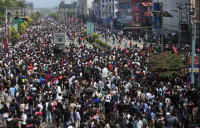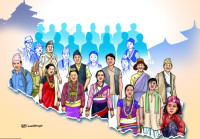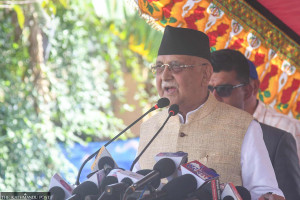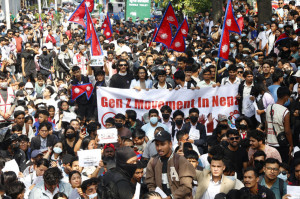Opinion
Love thy neighbour
The new constitution of Nepal is immensely important for cementing the historical ties between Nepal and India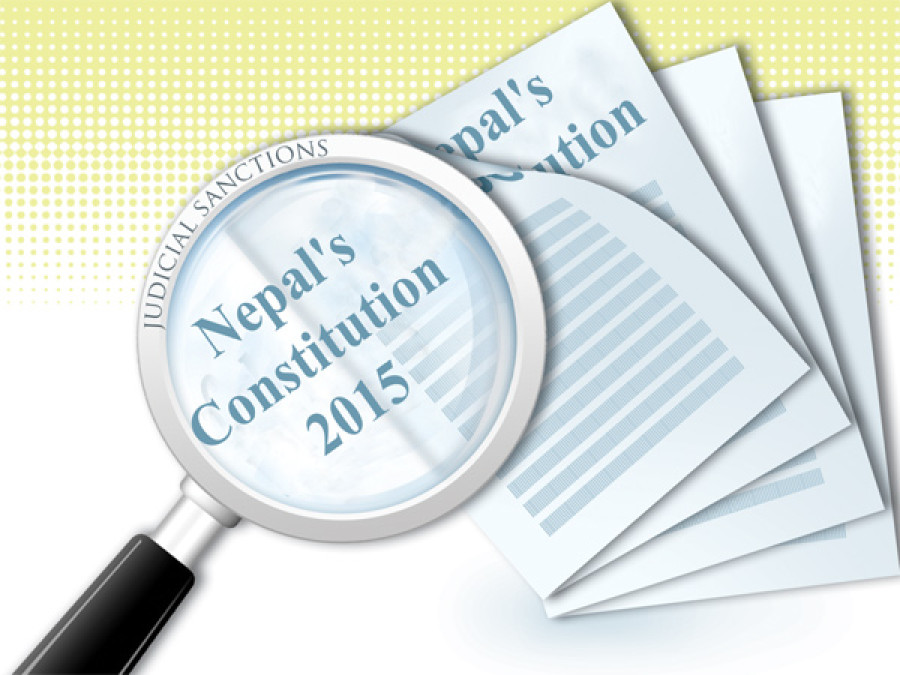
Surendra Bhandari
On Sunday, for the first time in the political and constitutional history of the country, Nepal received a constitution promulgated by its elected representatives. The aspirations of the Nepali people to write a statute through a Constituent Assembly (CA) since 1951, which finally began from 2008, have now
been met.
India, as one of the closest neighbours and a trusted friend of Nepal, has not yet welcomed Nepal’s new constitution. The Nepali people were quite eager to read an encouraging statement from the Indian Prime Minister Narendra Modi. Since Modi’s address to the CA of Nepal during his official visit in August, 2014, the Nepali people have regarded him as an iconic political figure. But the press statement issued on September 20, by the Indian Embassy in Kathmandu which read, “We note the promulgation in Nepal today of a Constitution,” left the Nepalis utterly disappointed.
Contentious remarks
To make matters worse, instead of welcoming the constitution and underscoring its federal, democratic and republican traits, on September 21, the Indian Embassy in Kathmandu issued another statement which read, “We are deeply concerned over the incidents of violence resulting in death and injury in regions of Nepal bordering India following the promulgation of Constitution yesterday. Our freight companies and transporters have also voiced complaints about the difficulties they are facing in movement within Nepal and their security concerns, due to the prevailing unrest.”
The press release further mentions that, “We had repeatedly cautioned political leadership of Nepal to take urgent steps to defuse the tension in these regions.” The terms ‘cautioned’ and ‘note’ have made it even more difficult for the Nepalis to comprehend India’s messages. Moreover, the foreign secretary of India, S. Jaishankar, who visited Nepal from September 17-18 mentioned in his statement that, “India has been strongly supportive of constitution making in Nepal. We would like its completion to be an occasion for joy and satisfaction, not agitation and violence.” However, it is very hard to appreciate the fact that Jaishankar, a citizen of a sovereign nation, asked the Nepali leaders, elected by the sovereign people of Nepal, to delay the promulgation of the constitution and also stressed that without India’s support to the new constitution, the support of other countries would be meaningless.
If the Nepali media coverage on this issue is indeed true, then these statements by Jaishankar emanate from the premises envisioned by the UN Charter and the Vienna Convention on Diplomatic Relations, 1961.
On the one hand, Jaishankar’s statement shows that India strongly supports constitution making in Nepal, and on the other, he insists on the delaying of the promulgation of the constitution. Any reasonable person would be reminded of double-standard diplomacy or of regional exceptionalism by such remarks. This sort of orthodox diplomacy exposes the deep-rooted reluctance of India to the accept the growth of democracy in its neighbourhood.
Political stability and federalism
The new constitution of Nepal is immensely important for cementing the historic ties between Nepal and India. In addition, it has plenty of provisions and mechanisms to address any political, economic, and cultural issues through a legitimate process. India has a long and evolutionary constitutional history, which includes the ‘basic structure doctrine’, ‘duty of citizens to respect the constitution’, ‘formation of a new state and reorganisation of boundaries’. Thus, India is expected to understand the strength of the evolutionary process enshrined in the new constitution of Nepal, which will be a cornerstone in permanently ending any unrest in the bordering areas as well. In a nutshell, the significance of the new constitution of Nepal can be explained through the following points.
First, it opens the doors to peace and political stability in Nepal. Both China and India can immensely benefit from political stability in Nepal. China is already the second largest economy in the world. India’s ambition to be the third largest economy is also within reach, which can be further facilitated by Nepal as an important entropot between China and India. Trade and commerce between China and India is not only important for Indian economic growth, but also for the economy of Nepal. Against this background, India and China’s full-hearted support of the new constitution of Nepal is not just in the interest of Nepal, but is also a win-win proposition for all the three
countries.
Second, the new constitution provides a modality of federalism that shares executive power at four levels and the legislative power at three levels. Having been a unitary state throughout its political history, Nepal has now adopted one of the most ambitious federal models among existing federal democratic countries. The historic exclusion experienced by different segments of Nepali society, including the Madhesi community, has been finally addressed by the new constitution. It has also offered opportunities to all Nepalis to participate in the political process as the equal citizens. Against this backdrop, as one of the largest democracies in the world and Nepal’s closest friend, India is expected to rise above its prejudices in support of the new federal democratic republic of Nepal. Any arrogance of power, size, economy, or geographical proximity may tarnish the regional and global image of India and its anticipated leadership role.
Support a friend
Third, the new constitution is not a perfect one. Like the charter of other countries, including the Indian Constitution, the Nepali constitution will evolve. It has institutionalised all necessary flexibilities to ensure its evolution through the tools of inclusive political representation, widespread recognition of fundamental rights, abolition of the caste system, mainstreaming the backward sections of society, space for affirmative actions, and powerful provincial and local governments with executive, legislative, and local judicial powers. So, the Nepali people deserve the appreciation of these provisions and support from India.
India’s friendship with Nepal should not be victim to arrogance and regional exceptionalism. If India chooses to praise Nepali democracy, it could take the friendship between the two countries to new heights.
Bhandari is a an associate professor of law at Ritsumeikan University, Kyoto, Japan




 26.12°C Kathmandu
26.12°C Kathmandu


